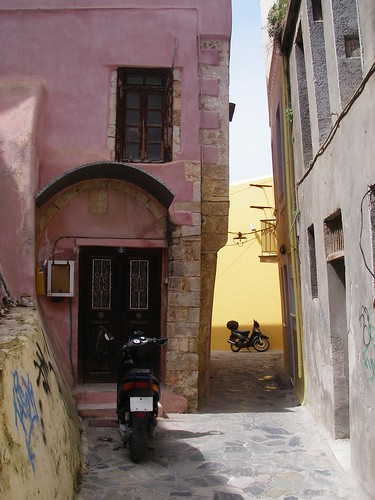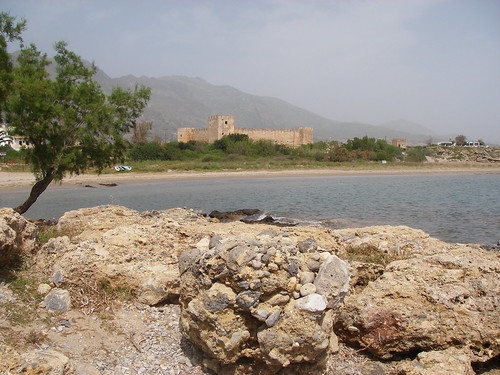The Long Way Round to Frangokastello
Thimia, the woman in charge of the guests’ wellbeing (ours and that of one other bloke), carried a tray over before we had finished sitting down and placed a plate piled high with pastries and toasties on the low table. The heady smell of chocolate hit me from what had to be large cups of sweet cocoa. I thought about asking for coffee, but when I parted the foam—so thick that a lesser spoon would have stood upright in it—the night-black liquid underneath turned out to be coffee, bitter and strong.
I bent down to sniff at the pastries, and noticed that the smell emanated from a large piece of marble cake. We were still ogling the selection when Thimia reappeared with a second, identical platter and set it in front of John. “Hungrrry!” She grinned, flashing white teeth, and beckoned us to dig in.
After wolfing down the marble cake, followed by a cheese and ham toastie, I thought I should restrain myself a little. Perhaps I could leave that soggy looking croissant—but John had taken a bite off his and chocolate was dribbling down his chin. Or that plain-looking roll? It was filled with apricot jam.
Oh well.
When we were about to burst, Thimia reappeared with two tall glasses of freshly squeezed juice from the sweet, deep-coloured Cretan oranges which graced trees in the gardens and groves we had spied from the bus window. I needn’t have worried about Sarakosti, the Greek Orthodox equivalent of Lent. The prescribed nistisima food makes no mention of chocolate or oranges, even though ham and cheese are frowned upon.
After this breakfast of kings, it was time to bid farewell to the Doge Hotel and the children playing in the street in front of it. A short way down the pavement their parents and relatives were busy setting out the tables at the ‘to Xani’ taverna.
We’d be back, that was for sure.
There was no particular rush. The only bus to Frangokastello would have left at two, but the people at the bus station confirmed what our landlady at the mill had told us: the road between Vriesses and Frangokastello was closed and not due to re-open for several days.
According to the bus company’s website, it should be possible for passengers to ‘progress from Vriesses’ (that info is now out of date and has been taken down). I wasn’t sure whether that meant that taxies—but not buses—could get past the roadworks, but if so it would save us money. As nice as Chania’s Old Town is, we decided to press on and find out.
Vriesses is a charming little town that stretches along a shady road leading into the mountains. The KTEL bus to Rethymnon and on to Heraklion stops there and we got out right next to one of the many kafenios that line the street. I left John there and went shopping. Half an hour later, laden with bags full of essentials which I doubted we would find in the small village of Frangokastello during Sarakosti, it was time to arrange for onward transport.
The taxi stand down the street was empty. We sat down in the adjoining restaurant for another drink and watched the surprisingly lively bus- and coach traffic, on their way to Chania or Rethymnon. There are at least 18 buses a day in each direction run by one of the two main companies alone.
When our coffee arrived, I asked the woman about taxies to Frangokastello.
“Frangokastello?” She pointed at the bus that had just rolled to a stop in front of the premises. “Frangokastello! That one!”
I smiled and shook my head. “The road is closed. Maybe taxi?”
But there was still no driver, so John went to make enquiries in the ticket office across the street.
At the same time, a taxi pulled up in front of the service station where the bus had just left. Vriesses is a very compact town.
The driver shook his head when I approached him. “Road is closed. You have to go via Rethymnon.”
He appeared reluctant to enter into further negotiations, so I waited for John to come back. I had given him the number of a cab company in Sfakia, who would presumably also be unable to help us. But I had an idea—and at the same time the driver, now parked at the taxi rank next to our table—turned back around to me. Perhaps he had the same idea. Perhaps we could arrange a relay: he’d drop us at one end of the roadworks and the guy from Sfakia would pick us up at the other. After all, he was unlikely to get many fares otherwise.
John was frowning when he reached us. “You know what, that bus was going to Frangokastello!”
“Don’t talk nonsense. The road’s closed!”
“It’s going the long way round.”
“Never!”
Oh yes, indeed. Apparently some locals who had to go to Sfakia had coerced the bus company to run a service all the way round via Plakias in the neighbouring province, and back up along the coast. I checked my watch: the timing was right. It could well have been the alleged once-daily bus via Frangokastello which, according to the schedule at Chania bus station, shouldn’t even run on Saturdays outside the season. And if so, it would be travelling along the route which the taxi driver now offered to take us for 70 Euros.
It was a fair price, but easily the most expensive cup of coffee we ever had.
But it was worth it when we got there.
Tags: Chania, Crete, Greece, Greece, Tag Index
